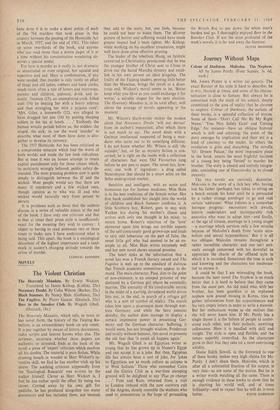NOVELS
The Violent Christian
The Heavenly Mandate. By Erwin Wickert.
(Deutsch, 18s.)
The Heavenly Mandate, which tells, in more or less novel form, the history of the Taiping Re- bellion, is an extraordinary book on any count. It is put together by means °Netters, documents, radio scripts and heaven knows what else. The reviewer, uncertain whether these papers are authentic or invented, finds at the back of the novel a piece of 'expert' criticism which resolves all his doubts. The material is pure fiction. While drawing breath in wonder at Herr Wickert's in- ventive skill, we find he has another trick up his sleeve. The scathing criticism supposedly from the `Sinological Research' was written by the author himself. Clever as Herr Wickert is, I feel he has rather spoilt the effect by being too clever. Carried away by his own gift for pastiche, he has produced altogether too many documents and has included them, not because
they add to the story, but, one feels, because he could not bear to waste them. The all-over picture of horror and suffering would have made greater impact had it been tighter. Mr. Kirkup, while working on his excellent translation, might well have done some effective pruning.
The leader of the rebellion, Hung, an hysteric converted to Christianity, proclaimed that he was the younger brother of Christ sent to China to drive out the hated Manchu dynasty and estab- lish in his own person an ideal kingship. The frailty of the Taiping leaders, proving little better than the Manchus, brings the revolt to a disas- trous end. Wickert's moral seems to be, 'Better keep what you }Ave as you could exchange it for worse,' a suitable slogan for the next election. The Heavenly Mandate is, in its total effect, well above the average of novels appearing at the moment.
Mr. Wilson's blurb-writer makes the modest claim that Necessary Doubt 'will not detract' from its author's reputation; after which there is not much to say. The novel deals with a German intellectual suspected of being a mur- derer who turns out to be something different. I do not know whether Mr. Wilson is still 'the outsider,' but, so far as mystery fiction is con- cerned, he is right on the inside with a collection of characters that were Old Favourites long before he put pen to paper. The novel has, how- ever, one 'with it' ingredient: a drug called Neuromysin that should be a smart seller on the Soho underground market.
Sensitive and intelligent, with an acute and humorous eye for human weakness, Miss Hale is in the best traditions of the female writer. Her first book established her insight into the world of children and Black Summer confirms it. A little Southern boy, Robert, goes to stay with Yankee kin during his mother's illness and arrives with only one thought in his mind: to return home. Robert's rejection of the 'love' showered upon him brings out terrible aspects of the self-consciously good grown-ups and leads to very odd behaviour on the part of Julie, the sweet little girl who had seemed to be an ex- ample to all. Miss Hale writes extremely well and her new novel shows unusual promise.
The heart sinks at the information that a novel has won a French literary award and • The Fugitive is well up to the standard of dullness that French academic committees appear to de- mand. The main character, Paul, dim to the point of non-existence, is an escaped prisoner of war sheltered by a German girl whom he eventually marries. The unreality of his comfortable retreat in the midst of a starving, devastated world drives him out, in the end, in search of a refugee girl who is a sort of symbol of reality. The search takes him upon a picaresque jaunt through war- torn Germany and while the hero remains sketchy, the author does manage to display a certain impressive power in presenting Ger- many and the German character. Suffering, it would seem, has not brought wisdom. Ponderous and totally without humour, this novel re-presents the old fear that 'it could all happen again.'
Mr. Waguih Ghali is an Egyptian writer so young that he has grown up in Nasser's Egypt and can accept it as a joke. But then, Egyptian life has always been a sort of joke, for 'jokes to Egyptians are as much culture as calypso is to West Indians.' Those who remember Cairo and the Gezira Club as a war-time stamping ground will be delighted to say 'Plus ca change . . .' Font and Ram, returned from a visit to London imbued with the now outworn cult of the Angries, closely resemble the students who used to demonstrate in the hope of persuading
the British Raj to put down the white man's burden and go. I thoroughly enjoyed Beer in the Snooker Club. If not the most profound of the week's novels, it is far and away the funniest.
OLIVIA MANNING






































 Previous page
Previous page